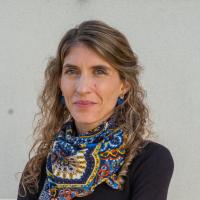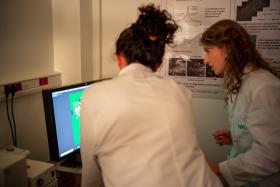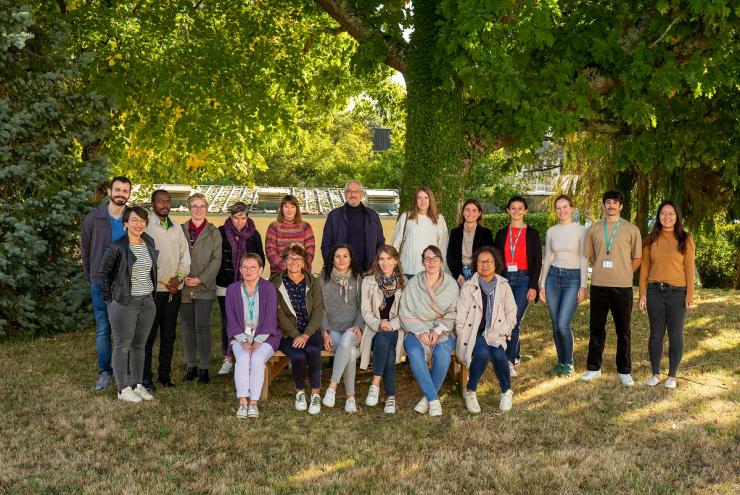
Food, Global Health Reading time 5 min
Claire Berton-Carabin and the science of emulsion
Published on 28 November 2022
It is a real delight to listen when Claire Berton-Carabin talks about her work on the structure and the physical and chemical stability of emulsions*. She goes into depth on this subject, calmly (for the most part) but surely, just like her brilliant career.
An overview of the world of lipids
With a degree in engineering, Claire very quickly became interested in lipids at the interface between the lab and industry. She began by doing a doctoral thesis at INRAE demonstrating that the composition and structure of the oil-water interface can be managed to protect lipids from oxidation in emulsions, particularly in terms of omega-3s, polyunsaturated fatty acids used to enrich certain food products due to their insufficient intake by most of the population.
The oil-water interface, a zone where a multitude of molecules interact
She then did post-doctoral studies in the United States. She spent "one of the best years of her life" there, happily ensconced in what she describes as "her comfort zone", i.e. being able to conduct research projects while, at the same time, having an immediate effect. During her stay in the US, Claire specifically developed a spectroscopic technique, i.e. electron paramagnetic resonance, to gauge the location and reactivity of small molecules of interest for food emulsion models.
Claire Berton-Carabin then returned to Europe and moved to Wageningen in the Netherlands. Driven by competition within the university, she developed her own lines of research, formed a team and strengthened her skills and knowledge while becoming more well-known. Claire worked on the composition of the oil-water interface in food emulsions, their structural properties and their physical and chemical stability. She instituted a multi-scale approach, developing new techniques, such as microfluidics or interfacial rheology, to reveal the mechanisms that control an emulsion's properties from its first milliseconds on.
In late 2018, she returned to France. Claire chose the region of Nantes to settle down with her family and secure her future career.
For healthy and sustainable emulsions

She was only 36 years old, but already had a decade of research on lipids and emulsions and more than 60 scientific articles when, in May 2020, she joined INRAE as research director in the BIA unit. Discerning and forward-looking (some might say visionary), Claire loves to brainstorm ideas and projects, "sometimes more than is necessary". A way to reassure herself, with her feet on the ground and her head in the clouds, with the enjoyment of moving forward in the directions she chooses and the satisfaction of seeing her projects through to the end.
Working in today's world of research with thoroughness, skill and good relationships
And she has plenty of projects. Building on the expertise she gained in the Netherlands, Claire is focussing on the microstructure of food emulsions and their key components with a desire to do more using new approaches. She wants to make use of the potential of plant proteins to stabilise food emulsions. She is already working on green processes to get protein-enriched ingredients, by prioritising soft processing methods such as dry fractionation. Claire is also interested in Pickering particles, solid stabilising particles named after the British chemist. Her idea: that the particles be biobased and contain natural antioxidants to play a dual role at the oil-water interface. She also really wants to find out what happens to such new products under digestive conditions, thereby going full circle from the creation of an emulsion to its digestion.
Firstly she has a team who are experts in the areas of plant proteins and lipids. A very useful skillset since protein constituents of plant origin often contain a significant portion of lipids! Secondly, she benefits from collaborative efforts within INRAE, "the perfect environment for establishing ties with colleagues who are looking at both plant genetic selection and foods", or in the outside world in France or beyond its borders.
And this award in all that? Claire thinks for a moment, her eyes sparkling. "It's both a recognition and a source of motivation, a distinction that supports me in my choices and the directions I am taking." An honour that she shares with everyone who has come along with her on her scientific adventure. An adventure? Better yet, a voyage, an extraordinary voyage that calls to mind Jules Verne, the famous writer from Nantes whose works Claire enjoys and to whom is attributed a quote that corresponds so well to our laureate: "Anything you can imagine you can make real".

And tomorrow?
Tomorrow is already here today: an abundance of ideas and projects underway driven by a commitment to promote minimal processing of ingredients or raw materials, product sustainability and nutritional quality. Did you say "keeping things natural"?
Mini-CV
38 years old
Married with 2 children
- Education
2019: Accredited to supervise research - University of Nantes
2011: PhD in Food Science - INRAE and University of Nantes
2008: Engineering degree in Food Science and Technology - French National School of Chemistry, Biology and Physics and University of Bordeaux 1
- Career
Since 2020: INRAE Research Director, BIA (Biopolymers, Interactions, Assemblies) Research Unit, INRAE Pays de la Loire Centre
Since 2019: Associate Professor, Food Processing Engineering Lab, University of Wageningen (the Netherlands)
2013- 2019: Assistant Professor, Food Processing Engineering Lab, University of Wageningen (the Netherlands)
2013: Postdoctoral Researcher, Danone Nutricia Research, Utrecht (the Netherlands)
2011-2013: Postdoctoral Researcher, Department of Food Science, University of Pennsylvania (United States)
- Awards and honours
2022: Promising Researcher INRAE award
2017: Young Lipid Scientist Award, European Federation for the Science and Technology of Lipids
2012: Dufrenoy Medal, French Academy of Agriculture
